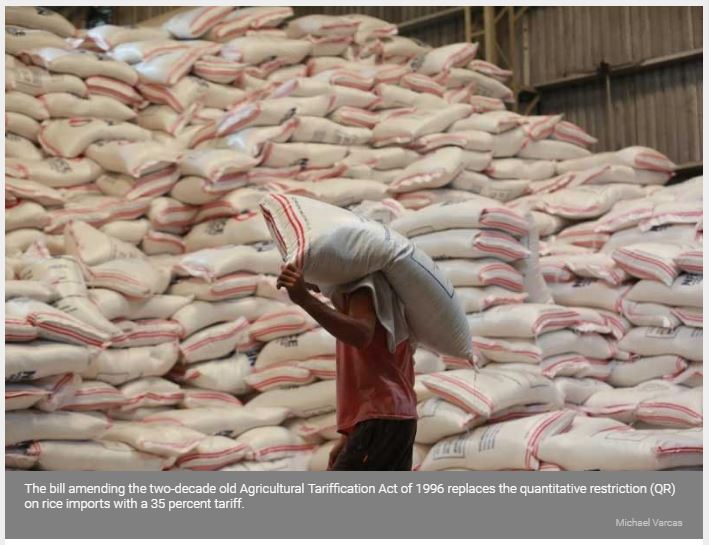Philippines: Enactment of rice tariffication bill to stabilize prices — NEDA
MANILA, Philippines — The National Economic and Development Authority (NEDA) urges the immediate enactment of the rice tariffication bill, saying it is “fundamental” to the stabilization of food prices.
The bill amending the two-decade old Agricultural Tariffication Act of 1996 replaces the quantitative restriction (QR) on rice imports with a 35 percent tariff.
It is set to be transmitted to Malacañang for President Duterte’s signature, having been ratified by both chambers of Congress last Nov. 28.
Under the new import regime, legitimate rice traders can import rice from various sources without permit from the National Food Authority (NFA), provided they secure a sanitary and phytosanitary import clearance from the Bureau of Plant Industry of the Department of Agriculture (DA) and pay the appropriate tariff to the Bureau of Customs.
The NFA, on the other hand, would merely focus on ensuring the sufficiency of buffer stocks for use in emergencies.
Socioeconomic Planning Secretary and NEDA chief Ernesto Pernia said as there is a need to periodically replenish the buffer stocks, the NFA can still sell cheap rice but to targeted markets.
“In selling rice, the NFA may opt to focus on far-flung areas, which some private traders may not find profitable to serve,” he said.
He also noted that even with tariffication in place, the rice subsidy provided under the government’s conditional cash transfer program would continue.
“The aim of the bill is to make rice accessible and affordable to every Filipino, and to make the rice sector competitive,” he said.
The bill also provides for the establishment of the Rice Competitiveness Enhancement Fund (RCEF) using tariff revenue, the proceeds of which would be used by the DA for productivity enhancing programs for rice farmers.
Key interventions to be financed by the RCEF include the improvement of farm mechanization, development of high-yielding rice seed varieties and promotion of use, expanded rice credit, crop diversification, and extension services.
As a safety net measure to the rice sector, the bill provides for the imposition of a special safeguard duty on rice in the event of sudden price fluctuations.
An SSG is essentially an additional tariff imposed on agricultural commodities, the purpose of which is to allow free trade but prevent foreign suppliers from undercutting prices charged in the domestic market.
In the event of a supply shortage, the President is empowered to allow importation of a specified volume at lower rates to increase supply and stabilize prices.
“Increasing the number of market players and competition in the rice sector are critical for the bill to deliver on its promise of lower rice prices for everyone,” said Pernia.
He also urged the DA, along with the Department of Trade and Industry (DTI) to carry out information dissemination campaigns on the new rice importation regime and ensure that rice traders are ready to participate when the bill is enacted.
Source: https://www.philstar.com/business/2019/01/10/1883690/enactment-rice-tariffication-bill-stabilize-prices-neda#jdoVeLyg603tgZvx.99


 English
English




